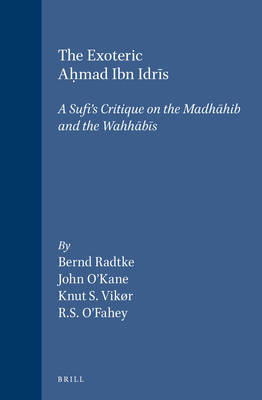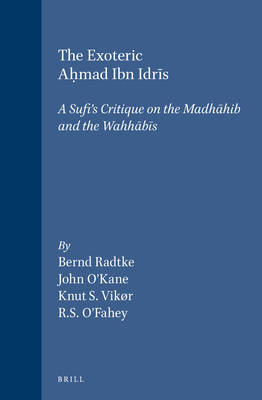
- Retrait gratuit dans votre magasin Club
- 7.000.000 titres dans notre catalogue
- Payer en toute sécurité
- Toujours un magasin près de chez vous
- Retrait gratuit dans votre magasin Club
- 7.000.0000 titres dans notre catalogue
- Payer en toute sécurité
- Toujours un magasin près de chez vous
The Exoteric Aḥmad Ibn Idrīs
A Sufi's Critique on the Madhāhib and the Wahhābīs
Knut Vikør, Bernard O'Kane, R S O'Fahey, Bernd Radtke
256,45 €
+ 512 points
Description
The Moroccan mystic and theologian Aḥmad b. Idrīs (1749-1837) was one of the most dynamic personalities in the Islamic world of the 19th century. Through his teachings and the activity of his students important Sufi orders were founded which exerted wide-ranging social and political influence, orders such as the Sanūsiyya in Libya and the Khatmiyya in the Sudan. To date, publications dealing with him have especially focused on his biography and particular aspects of his mystical doctrines.
In the present work an Arabic edition and translation with commentary of two texts are made available which throw light on Ibn Idrīs' attitude towards the religious-dogmatic questions of his day and age. The first text, Risālat al-Radd 'alā ahl al-ra'y, provides information about Ibn Idrīs' relation to the Islamic schools of jurisprudence, in particular his position regarding the ijtihād-taqlīd debate which was so significant in the 18th and 19th centuries. Like many similarly minded scholars of his time, Aḥmad b. Idrīs categorically rejects the authority of the established schools of jurisprudence and favors instead the application of personal methods in deriving a legal judgement.
The second text presented here is a vivid report by one of his students describing a debate which Ibn Idrīs, at an advanced age, entered into with a Wahhābī theologian in the Yemenite city of sabyā in 1832. The text makes clear with regard to which points Ibn Idrīs hoped to establish agreement with the Wahhābīs, and where it was not possible to reach any mutual understanding.
The introduction of the present book examines the tumultuous political circumstances in which both Arabic texts were composed and sketches the larger cultural and intellectual context which shaped Ibn Idrīs' world of ideas.
In the present work an Arabic edition and translation with commentary of two texts are made available which throw light on Ibn Idrīs' attitude towards the religious-dogmatic questions of his day and age. The first text, Risālat al-Radd 'alā ahl al-ra'y, provides information about Ibn Idrīs' relation to the Islamic schools of jurisprudence, in particular his position regarding the ijtihād-taqlīd debate which was so significant in the 18th and 19th centuries. Like many similarly minded scholars of his time, Aḥmad b. Idrīs categorically rejects the authority of the established schools of jurisprudence and favors instead the application of personal methods in deriving a legal judgement.
The second text presented here is a vivid report by one of his students describing a debate which Ibn Idrīs, at an advanced age, entered into with a Wahhābī theologian in the Yemenite city of sabyā in 1832. The text makes clear with regard to which points Ibn Idrīs hoped to establish agreement with the Wahhābīs, and where it was not possible to reach any mutual understanding.
The introduction of the present book examines the tumultuous political circumstances in which both Arabic texts were composed and sketches the larger cultural and intellectual context which shaped Ibn Idrīs' world of ideas.
Spécifications
Parties prenantes
- Auteur(s) :
- Editeur:
Contenu
- Nombre de pages :
- 236
- Langue:
- Anglais
- Collection :
- Tome:
- n° 31
Caractéristiques
- EAN:
- 9789004113756
- Date de parution :
- 16-12-99
- Format:
- Livre relié
- Format numérique:
- Genaaid
- Dimensions :
- 164 mm x 242 mm
- Poids :
- 589 g

Les avis
Nous publions uniquement les avis qui respectent les conditions requises. Consultez nos conditions pour les avis.






